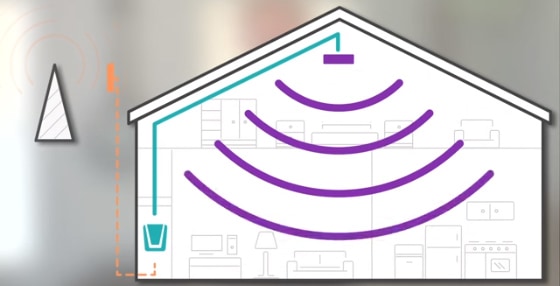Blog
Cell Signal Booster Oscillation and Why It Matters
January 16, 2023 — by NICHOLAS JONES
SHARE ARTICLE[Sassy_Social_Share total_shares="ON"]
When installing a cell phone signal booster system, antenna separation is important. Why? Because when the outside antenna and inside antenna are located too close together, they will pick up each other’s signals and create a feedback loop. This is called signal booster oscillation.
You’re probably already familiar with the negative effects of oscillation. That ear-splitting screech that results when a public address system microphone is placed too close to a speaker is a consequence of oscillation.
With cell signal booster oscillation, you won’t hear any noise yourself. However, the equivalent of that PA system screech will be picked up by all nearby devices on the cellular network.
Correcting cell signal booster oscillation
Signal booster oscillation interferes with cell signal transmission and reception. Left uncorrected, it can damage the cellular network. For this reason, the FCC requires all cell signal boosters to auto-detect oscillation. When oscillation is detected, FCC regulations require that the signal booster immediately take corrective action.
When a booster detects oscillation, it will automatically power down its gain, or signal boosting power, in an attempt to correct the oscillation condition. This gain reduction will reduce the booster’s indoor signal coverage area. If the reduced gain does not correct the oscillation condition, then the booster, by FCC regulation, must shut itself off. All this happens within a few hundredths of a second!
Obviously, we want to avoid cell signal oscillation to avoid gain reduction and booster shutdown. These can be prevented by locating the inside and outside antennas far enough apart from each other. weBoost refers to this as the Minimum Required Separation Distance, or MRSD.
Getting to MRSD
First step to preventing oscillation by observing MRSD is to find best location for your outside antenna. Here’s a blog post and a video that explain how to find the best location.
Blog: Find the Best Location for Your Cell Phone Signal Booster Antennas
The Installation Guide that comes with your signal booster explains the MRSD for your specific model. If needed, you can download an Installation Guide here. INSTALLATION GUIDES
Below are some general rules of thumb for MRSD and preventing oscillation.
When you install your booster system’s indoor antenna, you should ideally keep 25-30 feet of VERTICAL separation between the indoor and outdoor antennas. If this vertical separation distance is not possible, you can employ horizontal separation to achieve MRSD.
But be aware – the horizontal separation distance required to reach MRSD is greater than the vertical separation needed to get MRSD. Using a combination of vertical and horizontal separation to achieve MRSD is perfectly acceptable. Also, facing the inside and outside antennas in opposite directions will help you reduce MRSD. And a roof or wall between the two antennas may also help you reduce MRSD and increase your ability to avoid signal booster oscillation.
Some final thoughts
Of course, if you are using an omnidirectional outside antenna, you can’t face it in the opposite direction from the inside antenna because the omni has a 360-degree beamwidth. That means omnidirectional antennas require greater MRSD than directional antennas do.
To detect signal booster oscillation, look at the lights on the front of your booster unit. Red lights indicate oscillation. If you see red lights, increase the separation distance between the two antennas to correct the condition. To learn more about what the lights on a booster mean, watch this video.
A final reminder: failure to observe MRSD will result in your signal booster reducing gain or shutting down. If you experience signal booster oscillation shutdown, your booster will not restart until the oscillation condition has been corrected.
Did you like this post? Find it helpful? Do you have questions about this topic? Please let us know how we’re doing by commenting below.
Related Posts:
How Does a Cell Phone Booster Work?
Automatic Gain Control and Why It’s Important
What Do the Bars on Your Phone Mean?
buttonbutton SHARE ARTICLE[Sassy_Social_Share total_shares="ON"]TAGS: Education
